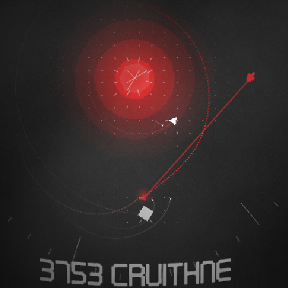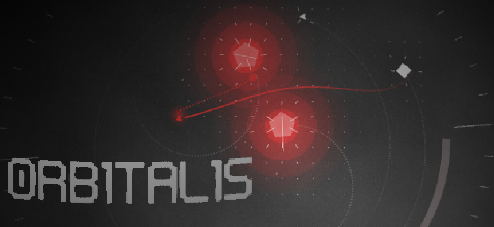![]() F=Gm1m2/r2. If you're not having flashbacks to high school physics, then prepare yourselves as Alan Zucconi's entry for Ludum Dare 28, themed "You Only Get One", is all about gravity. Be they big or small, near or far, everything has a gravitational effect on everything else. You just have to figure out the right balance. In the physics puzzler, 0RBITALIS, you control the trajectory of a satellite being launched into various celestial situations. With just one click of your mouse you'll send that object launching in the direction determined by your cursor's position and at a speed related to the relative distance of your cursor to the satellite. When positioning the mouse, you'll be given a red dotted line that will show the predicted path to help you determine whether or not that path will lead toward your goal of surviving until the clock runs out. Do that and you'll be able to move on to the next scenario.
F=Gm1m2/r2. If you're not having flashbacks to high school physics, then prepare yourselves as Alan Zucconi's entry for Ludum Dare 28, themed "You Only Get One", is all about gravity. Be they big or small, near or far, everything has a gravitational effect on everything else. You just have to figure out the right balance. In the physics puzzler, 0RBITALIS, you control the trajectory of a satellite being launched into various celestial situations. With just one click of your mouse you'll send that object launching in the direction determined by your cursor's position and at a speed related to the relative distance of your cursor to the satellite. When positioning the mouse, you'll be given a red dotted line that will show the predicted path to help you determine whether or not that path will lead toward your goal of surviving until the clock runs out. Do that and you'll be able to move on to the next scenario.
 Considering the 48 hour limit of a Ludum Dare game, the physics of 0RBITALIS work quite well with few situations that might be considered 'buggy'. Maybe it just skimmed the atmosphere of the planet? While the simple graphics and sound effects fit the gameplay well, other features, like pausing or level select, are missed. But these absences are not felt too strongly in the midst of the interesting experience Zucconi has put together in such a short amount of time. So hop to it, young gravity specialists. Oh, the star systems you'll go!
Considering the 48 hour limit of a Ludum Dare game, the physics of 0RBITALIS work quite well with few situations that might be considered 'buggy'. Maybe it just skimmed the atmosphere of the planet? While the simple graphics and sound effects fit the gameplay well, other features, like pausing or level select, are missed. But these absences are not felt too strongly in the midst of the interesting experience Zucconi has put together in such a short amount of time. So hop to it, young gravity specialists. Oh, the star systems you'll go!






FINISHED...
Gamma is so tricky
For Gamma,
I found that the trick was just to launch very, very slowly. I kept trying to achieve a stable orbit. Not worth the time.
John -
That was the only way I could finish Gamma. If there is a stable orbit, I'd love to know how to get it!
The main problem with the physics looks to be that the dt parameter (how long in simulation time is allowed to pass between each update on the forces and accelerations) is too large. This is why at high velocities you end up with straight edges with sharp angles between them rather than a smooth curve. But the smaller you make it the more CPU load. To get really good accuracy without it slowing down the developer would've had to use a much more advanced mathematical method such as Runge-Kutta algorithms. But that is really advanced stuff and for such a time pressured build and the limitation of the platform it was built in it's a pretty good job! Fun little time waster.
Update